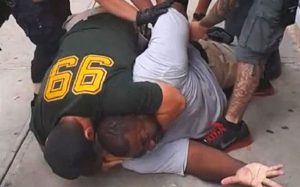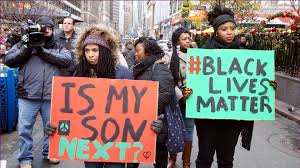Is Black Male Privilege A Real Issue in Our Community?
Share
Explore Our Galleries
Breaking News!
Today's news and culture by Black and other reporters in the Black and mainstream media.
Ways to Support ABHM?
By Gus T. Renegade, Atlanta Black Star

Eric Garner being choked to death by New York City Police in July 2014.
Days after New York City police officers choked an unarmed Black man to death in the summer of 2014, ForHarriet.com founder and editor Kimberly Foster declared she would “not march for Eric Garner.” Foster described “watching Black men show up for Garner after seeing so many derail conversations about Black women’s well-being leaves me with little more than a sinking feeling of despair.”
The perception that sympathy and political mobilization are unequally reserved for Black males has been gaining traction for well over a decade in intellectual circles. Sociologist L’Heureux Lewis and others describe this as “Black male privilege.” Lewis and others don’t suggest Black males are on the brink or world domination, but they do posit that in relation to Black females, Black males often enjoy greater access to resources and/or attention to their accomplishments and grievances. Speaking with journalist Michel Martin, Lewis, a Black man, explained, “There are actually spaces where Black men are advantaged and often sometimes dominate a dialogue,” often to the detriment of Black women.
In a 2016 report, Lewis corroborates the disparities that pained Foster, adding that when we seriously access the problems facing Black people, we “are most commonly raised and framed in terms of the crisis of Black males.” Using our framework of mass incarceration to demonstrate, Lewis observes Black males are the default representation of the prison’s consumption of Black bodies. This helps conceal the rising number Black female incarceration….Curry submits that the gawking and attention to Black males, framed by some as “Black male privilege,” are often little more than dehumanizing stares at Black corpses. After the dying moments of Eric Garner and Philando Castile accumulate millions of views, Curry writes, “Black men are rarely thought of beyond their dead bodies.” Recognizing the humanity of Black males and seeing that no more Castiles or Garners meet the same fate has proven impossible.

The title of sociologist Becky Pettit’s 2012 book “Invisible Men: Mass Incarceration and the Myth of Black Progress” challenges multiple facets of the view that Black males hog the attention related to racism. Because the prison system is disproportionately Black and male, Pettit believes large numbers of Black males are unseen. If these ignored inmates were included in our overall assessment of African-American advances, Pettit senses celebrations of Black progress would be greatly muted. With more than two million U.S. inmates at the time of Obama’s 2008 election, Pettit writes turning a blind eye to this large population of Black males distorts “the establishment of social facts” and “conceals inequality.”…
Curry asks: “If the effect of racism is such that the alleged advantages of men disappear in most of the things that we value, like work or life expectancy or home ownership, why make the leap” to insist Black males benefit from or exercise privilege?
Legions of Black males and a growing number of Black women are incarcerated because of white power, not Black privilege. Searching for “privileged” Black people can sidetrack Black males and females from producing the Black power needed to establish justice.
Read the full story here.
Learn about what some people describe as the “war on Blacks.”
Read more Breaking News here.









Comments Are Welcome
Note: We moderate submissions in order to create a space for meaningful dialogue, a space where museum visitors – adults and youth –– can exchange informed, thoughtful, and relevant comments that add value to our exhibits.
Racial slurs, personal attacks, obscenity, profanity, and SHOUTING do not meet the above standard. Such comments are posted in the exhibit Hateful Speech. Commercial promotions, impersonations, and incoherent comments likewise fail to meet our goals, so will not be posted. Submissions longer than 120 words will be shortened.
See our full Comments Policy here.